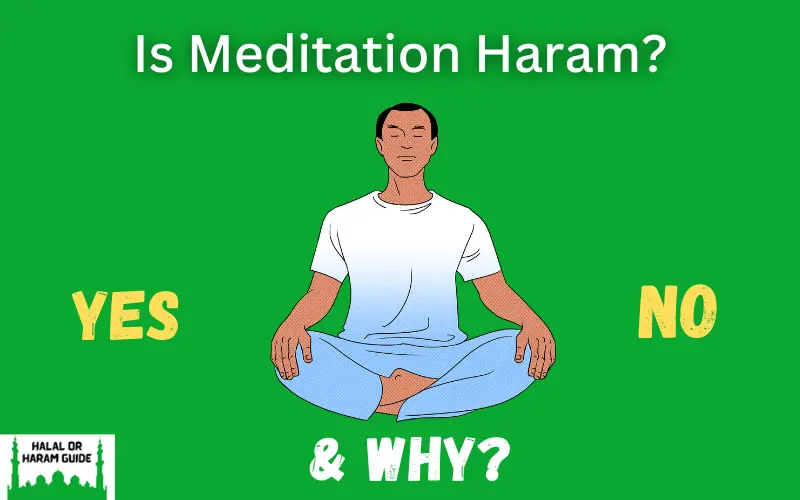Is Meditation Haram In Islam? (All Clear)
Meditation is an ancient practice that has been used for centuries to promote relaxation and spiritual awakening.
With time, it has grown in popularity and is now being practiced by millions worldwide.
However, there is much debate as to whether meditation is haram (forbidden) according to Islamic teachings because of its association with other religious practices, including Buddhism and Hinduism.
In this blog post, we will take a closer look at this and answer is meditation haram or halal in the eyes of the Islamic faith and discuss what the teachings actually say about it. So let’s clear the doubt.

Is Meditation Haram?
The answer to this depends on how you look at it and how you practice it.
If you view meditation as a religious practice and say words like ‘Om’ or ‘Amen,’ then yes, it is haram.
However, if you simply use meditation because science has proven its benefits and you don’t use it as a form of idolatry or worship, then it is halal.
Islam always encourages its followers to improve their quality of life, including physical health and mental and spiritual well-being.
Therefore, meditation can be seen as beneficial and halal if we do meditation without any religious purposes.
Many Islamic scholars answered this question, and the majority agree that meditation itself is not haram but should be done in moderation and with the right intentions.
If you meditate to relax, clear your head, and reflect on life without the intention of worshipping or praying and using words like ‘Amen’ or ‘Om,’ then it is halal and can benefit your wellbeing.
Otherwise, it is better to avoid it as these religious practices are haram in the eyes of Islam.
Lastly, note that meditation is not a compulsory practice in the Islamic faith, and there is no need to perform it if it does not benefit you.
Neither the Quran nor any hadith (teachings of Prophet Muhammad) mentions the practice of meditation, and a Muslim doesn’t need to do so.
There are many alternatives that a Muslim can use to increase their peace of mind and spiritual awakening, such as dhikr (remembrance of God), 5 times prayer, reading the Quran, and listening to Islamic lectures.
You might also like knowing is depression haram.
How To Meditate In Islam?
If you find meditation beneficial and would like to do it in accordance with Islamic teachings, here is some guidance on how to make sure that your meditation practice is halal.
1. Don’t mix religion: As stated before, the intention should not be to worship or pray but only to benefit from the relaxation techniques that come with meditation.
2. Avoid religious words: Refrain from saying words like ‘Om,’ and ‘Amen’ or invoking any deity, which is haram in Islam. These are some common words used in other religions, so it is best to avoid them when meditating.
3. Practice mindfulness: When meditating, think of Allah and be mindful of His presence around you. This will help ensure that your thoughts are directed towards God and away from anything haram, which meditation could lead to if done incorrectly.
4. Focus on Allah: Instead of focusing your energy on an idol or a deity, focus it on Allah and remember Him through dhikr and other forms of remembrance.
5. Keep it simple: Don’t overcomplicate or get carried away with the practice. Keep it simple, and do not add rituals involving worshipping or praying to a deity.
If you get suicide thoughts, you can learn is suicide haram.
Why Meditation Itself Is Not Haram?
It is important to also understand why meditation itself is not haram.
The reason behind this is that Islam does encourage its followers to take care of their physical and mental health as long as it does not go against the teachings of the faith.
Meditation can be a beneficial practice for individuals looking to relax and clear their minds from stress and anxiety.
According to science, meditation can reduce stress levels, improve concentration and focus and even help with chronic pain.
Therefore, it could be said that meditation is not haram but only if the intentions are pure and it does not go against any Islamic teachings.
Alternate To Meditation In Islam
Meditation can be a beneficial practice. However, some may wish to avoid it because of its religious connotations.
Also, if you’re not able to make it a regular activity or are worried about attracting towards other religions, there are many other ways to make sure that you can benefit from the same relaxation techniques without practicing meditation.
Here are some alternate techniques that you can use to achieve a similar effect:
1. Reading Quran Daily: Reading and reciting the Holy Quran effectively achieves peace of mind. It can help you build spiritual connection, focus on God and get closer to Allah. If possible, read it with meaning to understand what Allah has instructed us.
2. Dhikr: This means remembrance of Allah and is considered a powerful form of worship in Islam. It involves saying certain words or phrases that have been recommended by Prophet Muhammed (PBUH), such as “Subhanallah,” “Alhamdulillah,” and “Allah Hu Akbar.”
3. Doing Good Deeds: One of the best ways to achieve spiritual awakening is to do good deeds, such as helping others and being kind and generous to those around you. It can help you feel closer to Allah and remind yourself of your purpose in this world.
4. Praying Daily: Muslims are expected to pray five times a day, and this can help bring peace of mind and inner calmness. Even if you cannot pray at the exact times, just pray whenever you have time. Praying is a great way to remember Allah and stay connected to Him.
5. Performing Hajj: One of the five pillars of Islam, performing Hajj is a great way to get close to Allah. If you are able to perform Hajj, it can be a life-changing experience and give you a spiritual awakening.
6. Listening To Islamic Lectures: Take some time to listen to Islamic lectures or watch videos about the teachings of Islam from reliable scholars who are experts in religion. This can help you understand the faith better and ensure that your views are correct per Islamic teachings.
7. Exercise And Outdoor Activities: Exercise is another great way to stay healthy and keep your mind active. You can also do outdoor activities like swimming, horse riding, hiking, and cycling to get in touch with nature. Prophet also suggested doing such activities.
8. Spend Time With Family: Spending time with family is a great way to experience peace of mind and relaxation. It can help you bond with your loved ones and ensure you are emotionally connected to them.
These are some tips to achieve peace of mind without needing meditation.
Also see is tattoo haram.
FAQs
Q. Is meditating haram?
A. Meditating is not haram as long as it does not involve worshiping any deity or praying to any religious figure.
Q. Is guided meditation haram?
A. Guided meditation is not haram as long as it does not involve invoking any deity or praying to a religious figure.
Q. Is it haram to meditate?
A. It is not haram to meditate if you’re aware of Islamic teachings and make sure that your intentions are pure and you don’t say any words that go against Islam’s teachings.
Q. Is breathing meditation haram?
A. Breathing meditation is not haram as long as it does not involve worshipping a deity or praying to any religious figure.
Q. Is meditation sunnah?
A. No, meditation is not sunnah, as it does not involve any Islamic ritual or practice. However, doing things to maintain good physical and mental health is encouraged in Islam as long as it does not go against the teachings of the faith.
Q. Did Prophet Muhammad use to meditate?
A. No, Prophet Muhammad did not use to meditate. Instead, he used to spend time in prayer, horse riding, swimming, and archery.
Q. Can I listen to Quran while meditating?
A. No, it seems to be disrespected to listen to Quran while meditating as you can’t focus on both at the same time, and Quran should be heard with full attention.
Conclusion
In conclusion, it is important to remember that meditation is not aligned with Islam and should be avoided if you’ve alternate techniques to achieve peace of mind.
It is important to keep your intentions pure and avoid anything that may involve worshipping a deity or praying to any religious figure.
However, if you want to do meditation, ensure it does not go against any Islamic teachings.
I hope your search is meditation haram has been answered by this blog post.
If you have any further questions, please don’t hesitate to ask, and I’ll be more than happy to help. May Allah guide us all in the right direction. Ameen!






